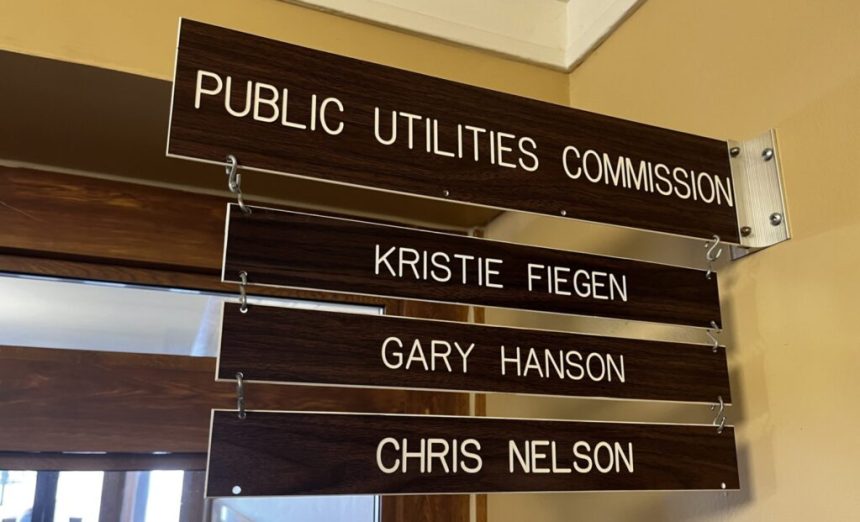A sign displays the names of South Dakota’s three elected public utilities commissioners outside of their Pierre office in January 2023. (Joshua Haiar/South Dakota Searchlight)
State utility regulators split Tuesday in Pierre over whether a proposed 120-megawatt energy storage facility in northeast South Dakota needs a state permit, ultimately voting 2-1 to deny a developer’s request for an exemption.
Crowned Ridge Energy Storage petitioned the South Dakota Public Utilities Commission in August for a declaratory ruling that the project does not meet the legal definition of a facility subject to state permitting. The project is designed to store excess electricity from the electrical grid and from Crowned Ridge Wind’s turbines in the Watertown area. It would store enough electricity to power tens of thousands of homes.
Crowned Ridge is an affiliate of Florida-headquartered NextEra Energy Resources.
Commissioner Chris Nelson moved to grant the company’s petition. He said regulating large-scale batteries would exceed the commission’s legal authority.
“Batteries don’t generate electricity,” Nelson said. “Secondly, if the Legislature had intended for these to be cited, they need to flat out say so, and not make us try to be electrochemical analysts to figure out whether it should or shouldn’t be.”
The energy storage facility, planned for commercial operation in December 2027, would be among the first large-scale energy storage projects in the state. Documents in the commission docket say the project would consist of rows of large lithium-ion batteries housed in white, semi-trailer-sized containers on about 15 acres.
Examples of energy storage systems. (Courtesy of Public Utilities Commission)
Mike Nadolski, a lawyer for the company, said the battery system does not generate new electricity and therefore falls outside the commission’s authority. He said the project simply stores and later injects that energy back into the power grid.
The state’s three elected commissioners are assisted by staff. Staff attorney Amanda Reiss said their review centered on whether discharging stored power back into the grid could legally be considered “generation.” Staff wrote in their review that the project could qualify as an energy conversion facility, which would require a permit. Staff left the question to commissioners after noting the laws were open to interpretation.
Commissioner Kristie Fiegen offered a substitute motion to deny the company’s petition and make it seek a permit.
“Yes, energy is stored chemically, but when it comes out, electricity is generated,” Fiegen said. “I’d rather err on the side of customer protection.”
Chairman Gary Hanson joined Fiegen, calling the matter “the beginning of a new era in electricity in South Dakota.” He said large-scale energy storage could reshape the grid and deserves regulation.
The 2-1 vote means Crowned Ridge must pursue a state permit; however, commissioners said the Legislature could still clarify how battery storage projects should be treated under South Dakota law. The Legislature will begin its annual lawmaking session in January.
SUBSCRIBE: GET THE MORNING HEADLINES DELIVERED TO YOUR INBOX









